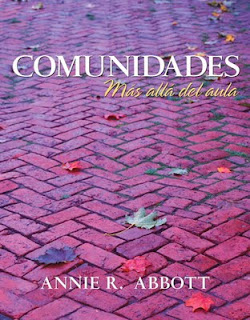Videos for Comunidades: Más allá del aula (3)
[Note from Ann Abbott: As an extra project, one of the "Spanish in the Community" students watched the videos that accompany Comunidades: Más allá del aula and has blogged about several topics that emerged for her. You can see the videos yourself:
- click on this link for Comunidades: Más allá del aula
- By "Welcome," choose "Unidad 1" from the dropdown menu
- Hit the "Go" button
- Click on "Videos" in the left navigation column]
by Haley Dwyer
Topics
Although the accents were the most challenging part of watching these videos, the range of topics was the most interesting for me. The vast majority of the topics that were discussed during the videos were both informational and pertinent to the information that I have learned throughout the semester. Because many of the topics that were discussed are not things that I normally talk about, in English or in Spanish, my knowledge of the Spanish language was truly tested.
The main thing that I noticed while I was watching the videos was that I had more difficulty understanding topics that were not interesting or completely new to me. For example, Ruth Montenegro’s, who is from Guatemala, video about business was incredibly difficult for me to understand. In fact, I had to watch all of her videos multiple times to simply get the point of them. It wasn’t that I didn’t understand the words, because she did not use complex or technical vocabulary. Instead I was simply not able to connect the words into sentences that made logical sense. It was almost as if she was speaking in strands of completely unrelated words. After reading the summary that is associated with each video and watching the videos multiple times, I did eventually grasp what Ruth was trying to say to the viewers. This phenomenon has never happened to me before and I was shocked when it did. The only reason that I can guess why this happened was because she was using words in a context that I was completely unfamiliar with.
Along with the difficulties that I encountered with Ruth Montenegro, I also encountered difficulties of a different kind while watching the videos of Luz Río, from Colombia. Because she was talking about bilingual education, a topic that I had no prior experience with, I found that I needed to look up many words so that I could grasp what she was saying. I think that because she is a well-educated woman who was talking about a specific topic that I am not familiar with, the vocabulary that she used was simply outside of what I have learned. Although it was difficult to watch this set of videos, I found the challenge interesting and rewarding when I could finally understand what she was saying.
Personally, my favorite part of these videos was when the speakers spoke about their home culture. I loved hearing about things that I had never really thought of before, like the fact that each Mexican state has its own unique culture and identity. My favorite person to listen to was probably Leticia Fonseca. Although she was challenging at first, her stories were personal and interesting to listen to. Her antidotes about her trials with the bank were both funny and thought provoking. I never thought of the fact that some countries didn’t use the banking system because it has always been a part of my life. Its little things like this that make a huge impact on the life of an immigrant and yet virtually no impact on the life of an American citizen.
One topic that I was disappointed that was not covered more was the differences between the speaker’s native culture and the American culture. Personally, I think that this would be extremely interesting and I would love to learn more about it. Along with the question of cultural differences, I would have liked to learn more about the differences in the education system. Only one of the speakers, Yolopatti Hernández, talked about the differences that she has seen. I was most curious about whether or not there is bilingual education throughout other Spanish-speaking countries or if it is only widely used in the United States. Besides these two things, I found the videos informative and I wish that they could have been better incorporated into the Spanish in the community syllabus.




Comments
Post a Comment